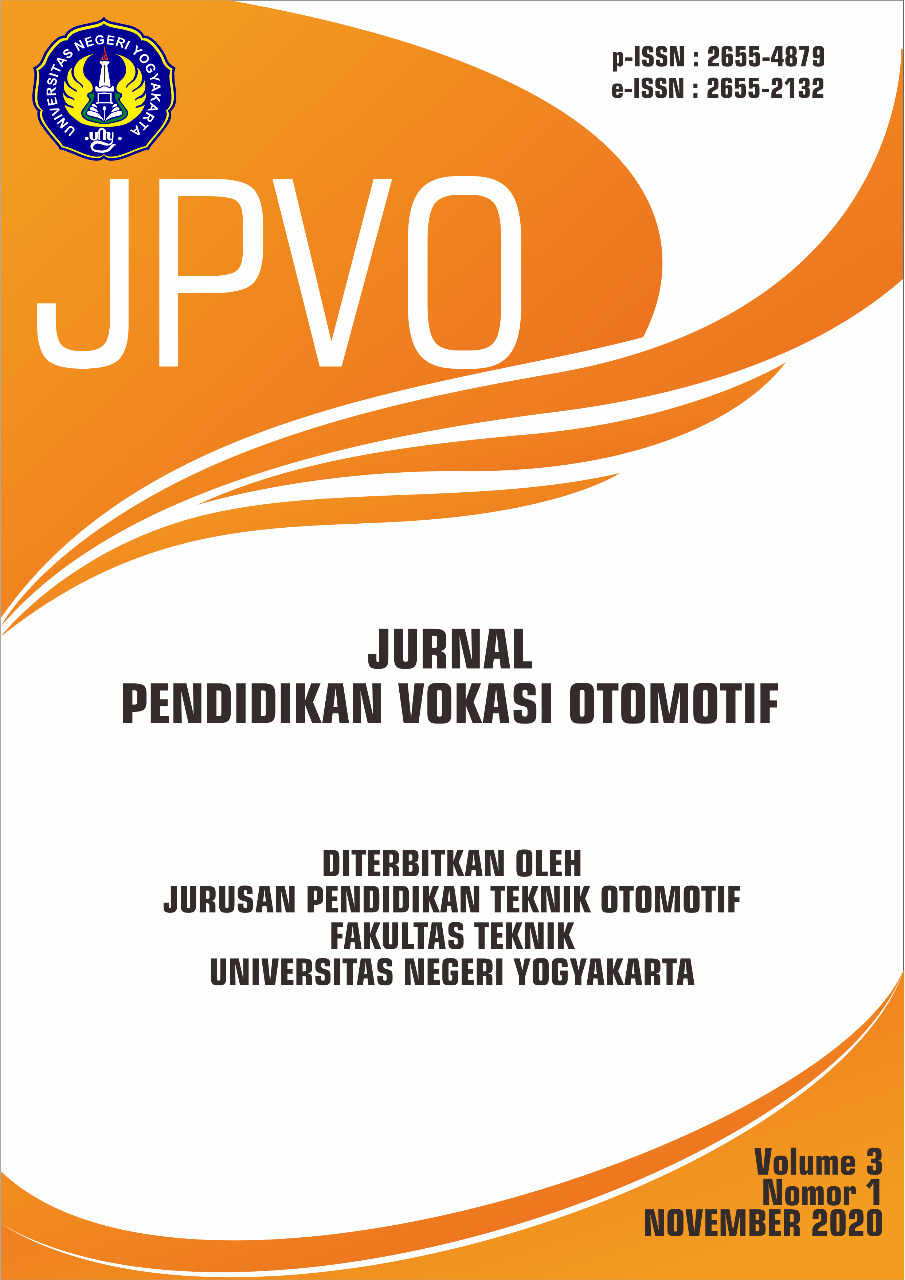EVALUASI PROGRAM PRAKTIK INDUSTRI PRODI PENDIDIKAN TEKNIK OTOMOTIF FT UNY
DOI:
https://doi.org/10.21831/jpvo.v7i1.78146Keywords:
Internship Program, Program Evaluation, Goal Oriented Evaluation, Goal AchievementAbstract
Internship programs play an important role in developing student competencies to meet the expectations of the working world. Internship programs need to be evaluated to maintain or improve their quality. This study aims to evaluate the achievement of the objectives of the Internship programs in the Automotive Engineering Education Department Faculty of Engineering Universitas Negeri Yogyakarta. This research is included in goal-oriented evaluation research (goal oriented model). The respondents to this study are students of the Automotive Engineering Education Study Program who have implemented industrial practices in 2022. Data was collected by questionnaires and interviews. Questionnaires are used to measure the achievement of industrial practice objectives while interviews are used for qualitative deepening of the results obtained from quantitative data. Quantitative data analysis techniques use descriptive statistics while qualitative data is summarized and synthesized and then spelled out clearly, and concisely. The results of the evaluation show that, 1) The objectives of Internship programs in general is included into the category of sufficient achievement; 2) There are 4 goals out of a total of 8 goals that included into the category of sufficient achievement, and 4 other goals fall into the category of high achievement; 3) A very significant factor causing the non-achievement of internship program goals is the Covid-19 pandemic which causes lectures to be carried out online so that student competencies are not sufficient to follow internship program.
References
Abdullah-Al-Mamun, M. (2012). The Soft Skills Education for the Vocational Graduate: Value as Work Readiness Skills. British Journal of Education, Society & Behavioural Science, 2(4), 326–338. https://doi.org/10.9734/bjesbs/2012/1858
Billett, S. (2002). Toward a workplace pedagogy: Guidance, participation, and engagement. Adult Education Quarterly, 53(1), 27–43. https://doi.org/10.1177/074171302237202
Binder, J. F., Baguley, T., Crook, C., & Miller, F. (2015). The academic value of internships : Benefits across disciplines and student backgrounds. Contemporary Educational Psychology, 41, 73–82. https://doi.org/10.1016/j.cedpsych.2014.12.001
Comyn, P., & Brewer, L. (2018). Does work-based learning facilitate transitions to decent work? 242, 1–34.
Dewi, L. R., & Kartowagiran, B. (2018). An evaluation of internship program by using Kirkpatrick evaluation model. Research and Evaluation in Education, 4(2). https://doi.org/10.21831/reid.v4i2.22495
Fakultas Teknik UNY. (2021). Pedoman Praktik Industri (PI), Praktik Industri Terbimbing (PI-T), dan Praktik Industri Mandiri (PI-M) " Merdeka Belajar – Kampus Merdeka ." Fakultas Teknik UNY.
Flynn, M. C., Pillay, H., & Watters, J. (2016). Industry–school partnerships: boundary crossing to enable school to work transitions. Journal of Education and Work, 29(3), 309–331. https://doi.org/10.1080/13639080.2014.934789
Gamboa, V., Paixí£o, M. P., da Silva, J. T., & Taveira, M. do C. (2021). Career Goals and Internship Quality Among VET Students. Journal of Career Development, 48(6), 910–925. https://doi.org/10.1177/0894845320902269
Gamboa, V., Paixí£o, M. P., & de Jesus, S. N. (2014). Vocational profiles and internship quality among Portuguese VET students. International Journal for Educational and Vocational Guidance, 14(2), 221–244. https://doi.org/10.1007/s10775-014-9268-0
Gamboa, V., Paixí£o, M. P., & Neves de Jesus, S. (2013). Internship quality predicts career exploration of high school students. Journal of Vocational Behavior, 83(1), 78–87. https://doi.org/10.1016/j.jvb.2013.02.009
Guskey, T. R. (2020). Breaking up the grade. Educational Leadership, 78(1).
James, I. (2010). A framework for developing vocational morals. Journal of Vocational Education and Training, 62(4), 395–413. https://doi.org/10.1080/13636820.2010.534812
Johari, A., & Bradshaw, A. C. (2008). Project-based learning in an internship program: A qualitative study of related roles and their motivational attributes. Educational Technology Research and Development, 56(3), 329–359. https://doi.org/10.1007/s11423-006-9009-2
Jonasson, C. (2014). Defining boundaries between school and work: teachers and students' attribution of quality to school-based vocational training. Journal of Education and Work, 27(5), 544–563. https://doi.org/10.1080/13639080.2013.787483
Liu, G. (2012). A survey on student satisfaction with cooperative accounting education based on CPA firm internships. Asian Review of Accounting, 20(3), 259–277. http://dx.doi.org/10.1108/ARA-11-2013-0076%5Cnhttp://dx.doi.org/10.1108/ARA-01-2014-0016%5Cnhttp://dx.doi.org/10.1108/ARA-04-2014-0050%5Cnwww.emeraldinsight.com/1321-7348.htm
Mardapi, D. (2017). Pengukuran, Penilaian dan Evaluasi Pendidikan (2nd ed.). Parama Publishing.
Mardiah, M., & Syarifudin, S. (2019). MODEL-MODEL EVALUASI PENDIDIKAN. MITRA ASH-SHIBYAN: Jurnal Pendidikan Dan Konseling, 2(1). https://doi.org/10.46963/mash.v2i1.24
Mathison. (2005). Encyclopedia of Evaluation. Sage Publication.
Narayanan, V., Olk, P., & Fukami, C. (2010). Determinants of internship effectiveness: An exploratory model. Academy of Management Learning & Education, 9(1), 61–80. https://doi.org/10.5465/ambpp.2006.22898555
Nisula, A. M., & Metso, S. (2019). Factors fostering vocational students' workplace learning success in the real workplace environment. Journal of Education and Work, 32(6–7), 552–569. https://doi.org/10.1080/13639080.2019.1673884
Pan, J., Guan, Y., Wu, J., Han, L., Zhu, F., Fu, X., & Yu, J. (2018). The interplay of proactive personality and internship quality in Chinese university graduates' job search success: The role of career adaptability. Journal of Vocational Behavior, 109, 14–26. https://doi.org/10.1016/j.jvb.2018.09.003
Pokhrel, S., & Chhetri, R. (2021). A Literature Review on Impact of COVID-19 Pandemic on Teaching and Learning. Higher Education for the Future, 8(1). https://doi.org/10.1177/2347631120983481
Stack, K., & Fede, J. (2017). INTERNSHIPS AS A PEDAGOGICAL APPROACH TO SOFT-SKILL DEVELOPMENT. NACE Journal, 78(1).
Suroto, S., & Hung, N. T. (2018). Management of an Industry Standard Class in Vocational High Schools. Jurnal Pendidikan Teknologi Dan Kejuruan, 24(1). https://doi.org/10.21831/jptk.v24i1.14710
The Economist. (2015). Driving the Skills Agenda: Preparing Students for the Future. The Economist Report.
Vu, T. L. A. (2018). Building CDIO approach training programmes against challenges of industrial revolution 4.0 for engineering and technology development. International Journal of Engineering Research and Technology, 11(7).
Yi, G. (2018). Impact of internship quality on entrepreneurial intentions among graduating engineering students of research universities in China. International Entrepreneurship and Management Journal, 14(4), 1071–1087. https://doi.org/10.1007/s11365-017-0491-2
Downloads
Published
How to Cite
Issue
Section
Citation Check
License
Jurnal Pendidikan Vokasi Otomotif allows readers to read, download, copy, distribute, print, search, or link to the full texts of its articles and allow readers to use them for any other lawful purpose. The journal allows the author(s) to hold the copyright without restrictions. Finally, the journal allows the author(s) to retain publishing rights without restrictions

Jurnal Pendidikan Vokasi Otomotif is licensed under a Creative Commons Attribution-ShareAlike 4.0 International License.
Based on a work at https://journal.uny.ac.id/index.php/jpvo.









